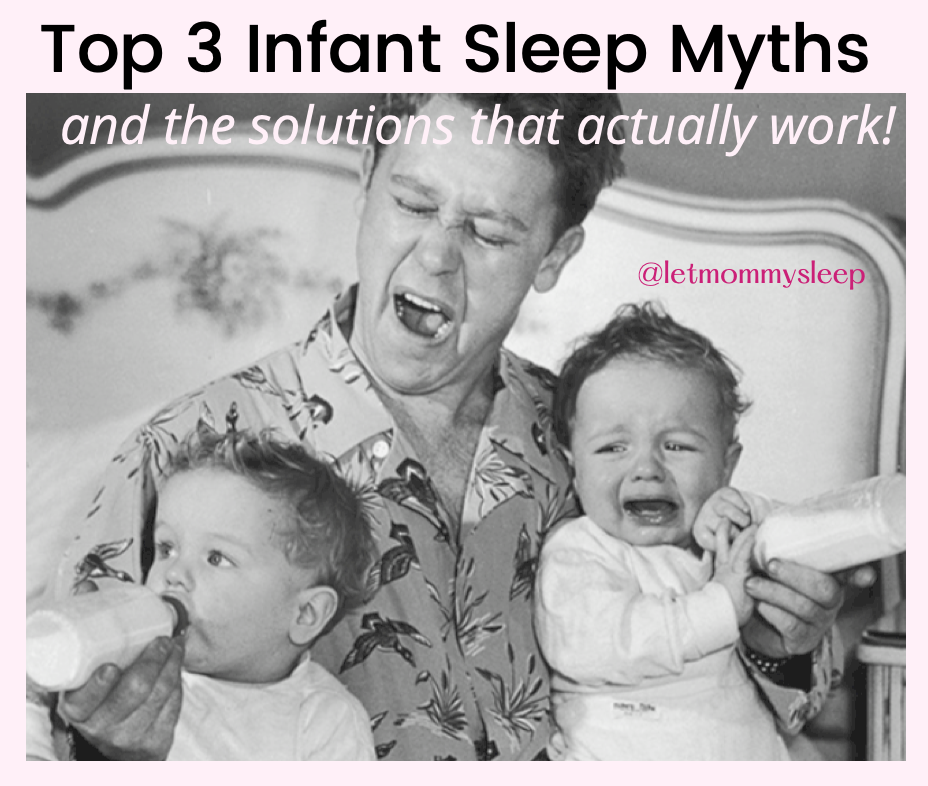Top 3 Infant Sleep Myths
We hear them at playgroups and baby showers, see them on message boards and read them on medicine bottles. Parental Urban Legends add more confusion to new parents’ already overloaded brains and with no basis in fact, they persist like Mikey and Pop Rocks. Here are our Top 3 Infant Sleep Myths and solutions that work better:

Myth #1. Putting rice cereal in baby’s bottle will help baby sleep longer
There is absolutely no evidence that shows that thickening milk or formula with cereal will make baby sleep longer at night. In fact, the most cited study on this topic, heartily disproves this parental urban legend.
In our desperation to “tank baby up” and buy an extra hour of rest, it’s often thought that a fuller stomach = more sleep. This is true when we give baby milk before bed to ensure that s/he doesn’t wake unnecessarily from hunger, but the addition of rice cereal to thicken a feed does not help baby sleep longer.
There is also a very real, evidence based movement to completely remove rice cereal from babies’ diet but that is for another post.
Why it’s become a parental urban legend: When parents introduce rice cereal in baby’s bottle, it is typically at the 8-12 week mark, when parents are at their wits end with getting up 3-4 times overnight. The fact is, baby is naturally sleeping longer stretches at this time anyway. Thickening formula receives the credit for what baby is doing naturally.
What to Do to Help Baby Sleep Longer: Time is the real answer to allowing babies to sleep longer stretches at night as the more baby grows, the more food their tummies can hold, keeping hunger from naturally waking them. But there are a few things that actually help newborns and infants sleep more soundly:
- Swaddling – eliminate baby waking up from involuntary reflex movements. Learn how to swaddle here!
- White Noise – drown out the noises that can wake baby up and simulate the womb
- Slow feeding with lots of opportunities to burp – hold baby upright for at least 20 minutes (longer if your baby experiences reflux) after feeding to be sure no gas is trapped and there’s plenty of time to digest.
Myth #2. Mylicon will Eliminate Gas and Soothe your Baby
This myth is near and dear to my heart because like so many, I desperately believed it myself with my own 3 kids. Study after study definitively demonstrate that Simethicone (the generic name for gas drops) is no more or less effective than a placebo. What does this mean? Gas drops don’t work. Period.
Why it’s become a parental urban legend: EVERYONE recommends Simethicone drops. Everyone! They even have their own little section in the pharmacy department. Once again well-meaning parents just want to help baby find some relief. Please try to contain your shock when I tell you this, but marketing companies love to capitalize on “soothing baby” so they sell, sell, sell a harmless but useless product.
And once again it’s you and your baby who should receive the credit for getting that uncomfortable gas out of baby’s tummy. Slow patient feeds, lots of burping and gently switching position or massaging baby to get gas out after feeding are tried and true ways to reduce gas.
What to Do to Help Eliminate Gas – While drops certainly can’t hurt there are several other options to help baby work out the gas that’s causing troubling:
- Bicycle Kicks –like this!
- Once again, slow feeds with lots of opportunity to burp during feeding. If bottle feeding, use the slowest nipple flow.
- Probiotics – Probiotics to promote good gut health in baby may be recommended by your pediatrician.
- When starting solids, give new foods for breakfast, this way baby’s system has all day to work out any issues that the new food might be causing…and by issues we mean gas! 🙂
Myth #3. Putting babies to sleep later at night means they’ll sleep later in the morning
We’ve all done this one. According to pediatric sleep specialist, Dr. Lisa Meltzer, “the internal clock is a powerful force that typically wakes young children up around the same time every morning, no matter what time they go to sleep at night.” This means that putting baby to sleep later robs them of sleep they should be getting. Even worse, poor night sleep adds to the overtired cycle the next day, making it more difficult for baby to settle and rest again.
Why it’s become a parental urban legend: Because staying up late and then sleeping late seems so logical! And we are desperate for sleep AND logic at this point! Sure there are times babies have a big day and sleep for long stretches out of sheer exhaustion, but this gives us a false positive. Keeping baby awake longer than their bodies need may work for one night or one nap, but fighting against baby’s natural rhythms leads to true exhaustion and meltdown.
What You Can Do Instead– Unfortunately, we can’t fight a baby human’s natural body clock; this one goes in the “this too shall pass” category. Taking turns with your partner or a loving caregiver to handle early wake ups won’t cause baby to sleep later but it will help YOU to sleep later!
If you’re expecting and want more tips, visit Your First Week Home with Baby: Ultimate Q&A
Categories
- Corporate Care & Partners
- COVID19 Archive
- En Espanol
- Expert Guides
- Hiring a Night Nanny
- Infant Safety
- Infant Sleep Hub
- Newborn Care
- Postpartum Health
- Twins & Multiples
- Work as a Night Doula
- zPost Archives
